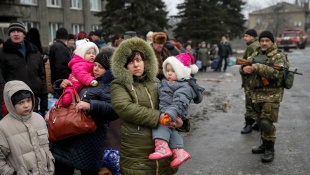The PCP expresses its deep concern at the serious developments in the situation in Eastern Europe, involving large-scale Russian military operations in Ukraine, far beyond the Donbass region, and calls for an urgent de-escalation of the conflict, for the establishment of a cease-fire and the opening of a path of negotiation.
The PCP reaffirms the urgent need for initiatives that contribute to a process of dialogue with a view to a political solution to the conflict in Ukraine, to a response to collective security problems in Europe, for compliance with the principles of the UN Charter and the Final Act of the Helsinki Conference – principles that the PCP defended when the wars against Yugoslavia, Iraq, Afghanistan, Libya or Syria were at stake, and which it continues to consistently defend today with the same conviction.
The PCP stresses that the worsening of the situation is inseparable from the dangerous strategy of tension and confrontation promoted by the US, NATO and the EU against Russia, which involves the continuous expansion of NATO and the reinforcement of its offensive military apparatus along the borders of that country, and which includes the instrumentalization of Ukraine, since the 2014 coup d'état, resorting to fascist groups, and which led to the imposition of a xenophobic and warmongering regime, whose violent action is responsible for the worsening of fractures and divisions in that country.
The PCP emphasizes that Russia is a capitalist country, whose positioning is essentially determined by the interests of its elites and holders of its economic groups, with a class conception opposite to that of the PCP. This position was expressed, particularly, in Putin's statements made earlier this week, which constitute a gross distortion of the remarkable solution that the Soviet Union found for the issue of nationalities and respect for peoples and their cultures. At the same time, it is important to underline that it is not expected that Russia, whose people have experienced colossal aggressions in history, considers it acceptable that a military siege be increased along its borders by means of an even greater expansion of NATO.
The solution is not war, it is peace and cooperation. In defence of the interests and aspirations of the Portuguese people and the peoples of all Europe, the Portuguese Government must act to support the end of the escalation of confrontation and to facilitate a negotiated solution, and not align Portugal with the strategy of increasing tension dictated by the US, NATO and the EU.
